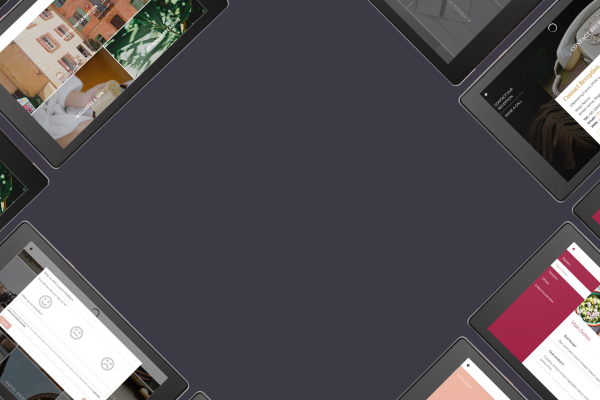In this blog post, you'll find out how you ensure you have an effective hotel management strategy.
Your hotel management strategy will help you grow your business and increase your revenue. It’ll help you reduce unnecessary costs, stay on top of hotel trends, and utilise the tools available to you. Having a structured plan for achieving your goals is the key to your success. So, what is an effective hotel management strategy and how can you improve yours? We sought advice from our expert, Moritz von Petersdorff-Campen, CEO of SuitePad GmbH, to explain the benefits of a good hotel management strategy.
1. Utilise Hotel Technology Systems
Moritz said, “Hotel management strategies are all about having a clear target customer in mind and developing your product and communications based on these target customers. It’s important that hoteliers make clear who their customers are and then identify how best to serve them according to their interests.”
Hotel technology is, therefore, a must for improving your business. There are plenty of options to help you streamline your management systems. Implementing in-room devices can create smooth lines of communication between your guests and staff, reducing the need for the ‘middleman’ and cutting out unnecessary wait times. This will lead to reduced staff costs, increased customer satisfaction, and improve productivity in your hotel.
You can also utilise booking systems to reduce the need for manually changing prices and availability of your rooms across online travel agencies and booking sites. This will reduce the risk of overbooking and inconsistencies in price.
This is particularly important because you want customers to continue their booking journey on your website; if they leave to shop around, you risk losing their business altogether or paying the commission of the booking the same room through a partner company. Consistent pricing will encourage your customers to book directly through your website. Technology is also a useful tool for tracking the competition to stay ahead of the game.
Moritz said, “the truth is, few guests select a hotel based on the type of guest directory, but our statistics show that 80% use it for 4-10 minutes per session. By engaging with guests in the hotel room, hotels communicate their services much better, enabling hotel guests to create memorable moments that they remember in the future, making them much more likely to return. User experience is a huge factor when guests decide whether to choose a hotel or its competitor. If a website is difficult to navigate, most people will move on to the next best option pretty quickly, losing out on giving you the chance to wow them with your wonderful hotel. Similarly, websites and booking platforms that have hidden fees or seem purposely confusing, particularly when it comes to costs, can be seen as dishonest by guests. Making your website easy and pleasant to use while also making it as upfront and honest as possible will get you a long way in the before-stay stage of the hotel guest experience.”
2. Collect Your Guest Data and Use it to Your Advantage
.jpg?width=559&name=Macbook_Backend_Dashboard%20(1).jpg) Collecting data from your guests can help you create personalised lines of communication to effectively engage with them.
Collecting data from your guests can help you create personalised lines of communication to effectively engage with them.
Sending your guests tailored emails and offers will actively encourage them to book with you. That personal touch is still very important; even as technology reduces face-to-face interactions, people still look for that personal connection. It’s important to strike a balance between sending regular, personalised emails and sending emails too frequently, so be sure to do your research about how best to engage with your customers and utilise their data.
You can also use the data you’ve collected to track and predict the patterns and habits of your users; this will help you understand trends and utilise particular seasons/events/times to increase or decrease your room prices to capitalise on busy periods and drive bookings in quieter periods.
3. Connect With Guests Through Social Media
Social media is an important tool for your hotel management strategy. It’s an ideal platform to interact with your previous and potential customers and send regular updates. These updates can be directly linked to your hotel, such as upcoming events or promotions, or they can be for the local area; if you remind them of a local event, they’re likely to remember you when they need somewhere to stay.
This also creates the perfect opportunity for partnering with local businesses. You can advertise their event on the basis that they’ll advertise your hotel to their attendees. You can also offer to host local events, such as Christmas markets or music festivals. Getting involved with your local community can help increase awareness and visibility of your brand, generating bookings, and increasing revenue.
Social media is also great for competitions. Asking followers to share a post to win a prize will generate lots of interaction and also reach a wider audience. Creating posts with a name and utilising GIFs and emojis can help create a personalised interaction between you and the customer. Depending on your brand, you may not feel emojis are appropriate - but looking for ways to use social media to relate to your audience is key.
Social media is often used for sharing photos, so it’s worth creating Instagram-worthy backdrops - be it having well-maintained grounds and beautiful views, or indoors with biophilic walls or water features. Beautifully presented food and cocktails are often successful on social media too, so it makes good business sense to ensure your staff are trained in the art of presentation. Remember to create personalised hashtags so your guests can tag their photos and link them back to your hotel.
Moritz said, “one great resource of insights for me is fellow entrepreneurs in the hotel tech space. A lot of smart people working on different solutions to various problems and talking with them and exchanging ideas is a very relevant resource of information for me. Social media platforms such as LinkedIn is great for seeing what’s going on in the tech space, and it’s also a great space for hoteliers to learn about developments in hotel tech.
“Furthermore, being in touch with our customers is a priority. Every week, I have different meetings with existing customers and prospects. This is the perfect mixture of having insights from many of the companies that are building the solutions that change the industry and have an insight into where the market is heading.”
4. Upsell Your Products
When your guests book a room, you can use the data you’ve collected to offer them exclusive extras and add-ons tailored by their previous habits or searches. These can be spa discounts or room upgrades, based on what they’ve booked previously, or even just a reminder to book a table at the restaurant. You could, for example, ask if they’d like to upgrade to a room with a sea view.
These extras don’t even have to be of monetary value; you could ask if they require room service, based on the knowledge that on their last stay they asked not to have their room cleaned daily. This will not only provide a personal experience that your guests will appreciate, but it will also reduce your staffing requirements and save you money. You could incentivise longer stays by offering discounts or free added extras, particularly during quiet periods, as this will drive your hotel’s occupancy rates and drive higher revenues.
Moritz described how brand loyalty is essential in increasing revenue. He said, “digital guest directories are also great ways to steer guests to join your loyalty program. For larger hotel chains, creating brand loyalty is a proven way to increase overall revenue. If digital guest directories can help drive an increase in guests joining hotel loyalty programs, hoteliers can expect to see a real increase in revenue generated from these guests across the chain. Knowing your guests is the most important thing when optimizing revenue. You do not want to spam them with offers but send the right message to the right customer at the right time. The hotel industry is one of the best use cases for applying and analysing customer data, but so many hotels don’t implement this as part of their business plan.
Once you know what guests want, you can then use the channels you have at your disposal to make offers and trigger actionable responses. The great thing about SuitePad is that it can collect information but also send offers to customers. The push functionality is an especially great tool as this is usually not available or can be blocked by the guest with solutions that are based on a guest’s personal device.”
5. Push Popular Events During Quiet Periods
During the quieter periods in your hotel, try to book events such as stage shows, music nights, or art exhibitions. Having exciting events take place during a quiet period will encourage more bookings and increase your revenue at a time when your hotel occupancy may be low. Spread the word organically through social media and personalised emails to generate excitement and drive bookings.
This is also a time to push for weddings if your hotel has the capacity to host them; weddings are an expensive event, so it might be worth offering cheaper package deals during the low wedding seasons, such as January through to March. You can market it as a winter wedding, whilst driving booking rates in a month where you’d usually see empty rooms.
Applying these tips to your hotel management strategy can help improve your business and maximise your revenue.
For further advice, check out our blog on increasing your sales revenue.
Alternatively, request a demo to see how our products can help you improve your hotel management strategy
- Published on June 30, 2021




.png)
.png)
